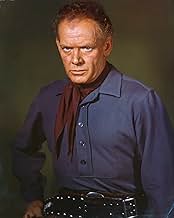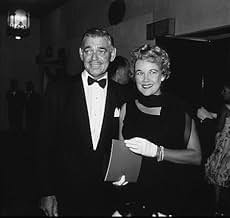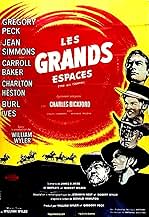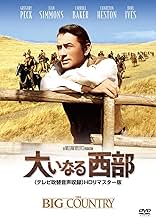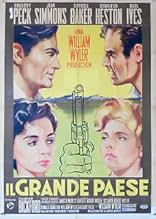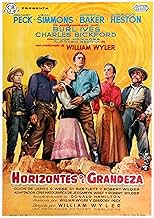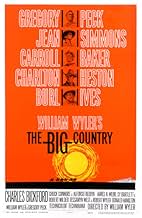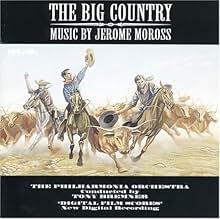CALIFICACIÓN DE IMDb
7.9/10
23 k
TU CALIFICACIÓN
Un hombre de Nueva Inglaterra llega al Viejo Oeste, donde se ve envuelto en una disputa entre dos familias por una valiosa parcela de tierra.Un hombre de Nueva Inglaterra llega al Viejo Oeste, donde se ve envuelto en una disputa entre dos familias por una valiosa parcela de tierra.Un hombre de Nueva Inglaterra llega al Viejo Oeste, donde se ve envuelto en una disputa entre dos familias por una valiosa parcela de tierra.
- Dirección
- Guionistas
- Elenco
- Ganó 1 premio Óscar
- 3 premios ganados y 5 nominaciones en total
Slim Talbot
- Terrill Cowboy
- (as Jay Slim Talbot)
Richard Alexander
- Party Guest
- (sin créditos)
Rudy Bowman
- Party Guest
- (sin créditos)
Opiniones destacadas
As several characters state in the film, "This is a big country" and THIS is a BIG MOVIE. It screams out for widescreen viewing. Many of the characters are largely and broadly drawn with big strokes (stubborn Peck, fiery Baker, resentful Heston, righteous Simmons, imperious Bickford, cantankerous Ives and slithering Connors) yet they all are dwarfed by the huge landscape. Tall men, horses, trees and houses are all presented as so many ants on an ant hill in many of the images. The film has a compelling story and intriguing interpersonal relationships and rivalries which are all enhanced by this larger than life approach. The landscape is sometimes awe-inspiring, notably in the Blanco Canyon scenes near the end of the film. Peck is appropriately straight-laced and uncomfortable in this rough & tumble setting, lovely Simmons is a likable heroine and Baker is an effective daddy's girl with misplaced affections. Connors acquits himself very nicely as a thoroughly detestable punk. Heston comes off extremely strong in this film. He's completely at home and was probably never more handsome (check out the scene in which he's roused from his bed by Peck!) He makes the most out of this secondary role. Bickford and Oscar-winning Ives make a great pair of adversaries...almost makes one wish for a prequel to see what got these two so riled up (but today's filmmakers couldn't be counted upon to do it in a tasteful, classy way.) Memorable scenes include the taunting of Peck by Connors and his brothers, Ives grand entrance into Bickford's house and an almost legendary fight scene between Heston and Peck. All of the above are raised to an even higher plane of excellence by what must be one of the greatest musical scores in film history (western or otherwise.) Jerome Moross composed several themes (the opening title is the best known) which put this film into a whole new category of enjoyment. The score stands alone as a beautiful listening experience and paired with the images in this film, it is amazing. It occasionally seems intrusive, yet knows when to keep quiet as well. The Oscar that year went to Tiompkin's "Old Man and the Sea", but it seems astonishing that anything could have bested this score. The film's only real flaw is slight overlength, but nothing really stands out as aching to be cut! Maybe just bits and pieces....but, really, the story just takes it's time and builds to some stirring moments.
The Big Country was passed over by the professional critics as being empty, ernest, and not enough sweep to be called a true epic. Well, I remember seeing The Big Country and was properly swept off my feet by the grand scale of the Big Country, the death feud between Burl Ives and Charles Bickford, the shaky and doomed romance between Gregory Peck and the spoiled Carroll Baker and the quiet understanding between Peck and the lovely Jean Simmons, but most of all, the thing that propelled me to see The Big Country over and over was the magnificant score by Jerome Moross. Sure, I could site many scores that have aided films to glory, Max Steiner for The Letter, Maurice Jarre for Lawrence of Arabia, Miklos Roza for an excellent score for a weak epic Land of the Pharaohs, and Hans Zimmer for an excellent score for a great epic Gladiator but I still say that for a western you can't get any better than the magnificant score for The Big Country. The sweep and majesty and the quiet moments of Jerome Moross's music sets the tone for this truly underated movie. United Artist released the music on LP and I wore mine out along with my neighbors complaints, I now own an excellent CD produced by SILVA SCREEN which I can't wear out. All in all see The Big Country on your big screen in Widescreen and give yourself a real treat. Who needs Giant?
I'm always appalled at how little William Wyler I've seen. I adore The Best Years of Our Lives and Roman Holiday, but Ben-Hur is underwhelming. Now with The Big Country winning my heart, he really deserves better. I'm a sucker for a good subversive Western. The myth of the American frontier in cinema is fascinating to me and any film that develops the ideas inherently has my attention. The Big Country is credited as the first pacifist Western as Gregory Peck refuses to fight until the last moment or acknowledge the seriousness of any conflict. He's an unconventional hero. One who teeters a line of cowardice. But this just makes him all the more endearing as a three dimensional character. Granted, the film has its caricature characters on the side, but the script has such a dry wit. Burt Ives won an Oscar for his role and coming in an hour into the film, there wasn't much spotlight left to share, but he certainly has his moments. It's a grand epic in visuals and length that I easily sunk into. It's a big country alright. Also boasts one of the best scores I've ever heard. Can't believe it's not considered a greater classic.
8/10
8/10
There are many things to enjoy in 'The Big Country'. The landscape itself is a character that seems overwhelming. There are many panoramic shots of it, sweeping out to a misty horizon. All beautifully photographed. This big country seems to glow and the film gets an appropriate music score, sweeping and colourful. It must be one of the most perfect film scores written.
In this breathtaking landscape the story of the characters unfold with their prides, jealousies, fears, loves, pretensions, hopes, disappointments. The actors are first rate and convey lots of feeling not just in dialogue but in looks. It is worth seeing more than once to catch the emotional nuances. This is a film with space in lots of senses and it gives the cast time to flesh out their characters. In all the splendid acting I have a particular admiration for Chuck Connors in a performance of a lifetime. His Buck Hennassey is a coward and a bully yet you can't help feeling sorry for him in the end.
There is also the political undertones, the oft quoted Cold War parallels, embodied in the confrontation between Bickford and Ives of mutually assured destruction, that was an ever present issue in the late fifties. Bickford and Ives have narrow self interested vision that portends destruction, while the Peck character has a wider view of co-operation and fairness. (In an illuminating exchange at the engagement party a guest asks Peck if he has seen anything bigger than the 'big country' and Peck replies to the guest's astonishment that he has, a couple of oceans!) It is the outsider who sees clearest.
William Wyler was a great director and made a great film to be enjoyed on many levels. It is an aural and visual treat but the film also has believable characters performed by a superior cast. And I can't stop humming that theme tune....
In this breathtaking landscape the story of the characters unfold with their prides, jealousies, fears, loves, pretensions, hopes, disappointments. The actors are first rate and convey lots of feeling not just in dialogue but in looks. It is worth seeing more than once to catch the emotional nuances. This is a film with space in lots of senses and it gives the cast time to flesh out their characters. In all the splendid acting I have a particular admiration for Chuck Connors in a performance of a lifetime. His Buck Hennassey is a coward and a bully yet you can't help feeling sorry for him in the end.
There is also the political undertones, the oft quoted Cold War parallels, embodied in the confrontation between Bickford and Ives of mutually assured destruction, that was an ever present issue in the late fifties. Bickford and Ives have narrow self interested vision that portends destruction, while the Peck character has a wider view of co-operation and fairness. (In an illuminating exchange at the engagement party a guest asks Peck if he has seen anything bigger than the 'big country' and Peck replies to the guest's astonishment that he has, a couple of oceans!) It is the outsider who sees clearest.
William Wyler was a great director and made a great film to be enjoyed on many levels. It is an aural and visual treat but the film also has believable characters performed by a superior cast. And I can't stop humming that theme tune....
The Big Country is one big and fun western with concurrent plot lines. The first is the struggle between two implacable enemies, Charles Bickford and Burl Ives. The second is a four sided romantic triangle involving Gregory Peck, Jean Simmons, Charlton Heston, and Carroll Baker with Chuck Connors trying to horn in.
William Wyler directed the almost three hour western with a sure hand and your interest does not wane for one minute in this film. Gregory Peck also was a co-producer on this film as well as the first billed. He had a hand in casting a lot of the film, specifically Burl Ives in his Academy Award winning performance as Rufus Hannessy.
It's the Terrills versus the Hannessys. Charles Bickford is the local Ponderosa owner Major Terrill. Presumably the title comes from the Civil War. Bickford does play Terrill with a military bearing. My guess is that he was a Yankee soldier.
The Hannessys would now be called white trash. They look like hillbilly folk who also came west for fame and fortune. They've also got a big spread in a place called Blanco Canyon. They hate the Yankee Major as much as he hates them.
Sitting between them is Jean Simmons who has inherited a modest piece of land that sits across a river that both outfits water their cattle on as per an agreement with her late grandfather. She doesn't work the land herself any more, she teaches school in town.
Simmons tries to keep above the feud. She is friends with Carroll Baker, Charles Bickford's daughter. She's been east and is bringing home a prospective bridegroom who is a former sea captain played by Gregory Peck. That doesn't sit well with Charlton Heston who is the Terrill foreman. He's got eyes on Baker himself and Chuck Connors who is Burl Ives eldest son has eyes for Simmons when he's not in the local bordello.
A lot of started and broken relationships and a few of the cast members being killed occurs in The Big Country. My favorite scene and line in the film is when Burl Ives gives some advice to Chuck Connors on how to woo and win Jean Simmons. His big advice is to show her how much you care by taking a bath occasionally.
Charlton Heston took a role that was fourth billed because he wanted the opportunity to work with William Wyler. That was one great career move because Wyler and he hit it off so well that Wyler signed him for the lead in his next film which turned out to be Ben-Hur. Heston in his memoirs, conservative as he became, says he also got along very well with Gregory Peck who he called a "thinking man's liberal."
Peck and Wyler had worked together previously on Roman Holiday and had done good work there and also hit it off. However with Peck as a co-producer as well as star they had some clashes on the set. One notable one involved Peck wanting to retake the carriage scene where the Hannessy brothers attack Peck and Baker on the way to the Bickford ranch. Peck wasn't satisfied and wanted a retake. Wyler who was legendary for doing scenes dozens of times until he got what he wanted refused. Later when shown the finished film, Wyler had edited out and around what Peck didn't like and it came out OK. They remained friends, but never worked together again.
Simmons as the independent minded school teacher and Baker as the spoiled daddy's little girl acquit themselves well in their roles. Baker is disappointed in Peck not seeing him as her ideal western man and Simmons upbraids her with the quote I put in the review title.
This is also the final film of Alfonso Bedoya who never did get a role in an American film as good as the one he had as Gold Hat in The Treasure of the Sierra Madre. Still this is a fine farewell performance to a very colorful and talented player.
When he's on the screen Burl Ives dominates and fills it and not just physically either. Rufus Hannessy may not be to the manor born, but he has his own sense of integrity and fair play. All that Burl Ives captured in Rufus and The Big Country is worth watching just for him alone.
And that Jerome Moross score; simply one of the best ever done in the history of film.
William Wyler directed the almost three hour western with a sure hand and your interest does not wane for one minute in this film. Gregory Peck also was a co-producer on this film as well as the first billed. He had a hand in casting a lot of the film, specifically Burl Ives in his Academy Award winning performance as Rufus Hannessy.
It's the Terrills versus the Hannessys. Charles Bickford is the local Ponderosa owner Major Terrill. Presumably the title comes from the Civil War. Bickford does play Terrill with a military bearing. My guess is that he was a Yankee soldier.
The Hannessys would now be called white trash. They look like hillbilly folk who also came west for fame and fortune. They've also got a big spread in a place called Blanco Canyon. They hate the Yankee Major as much as he hates them.
Sitting between them is Jean Simmons who has inherited a modest piece of land that sits across a river that both outfits water their cattle on as per an agreement with her late grandfather. She doesn't work the land herself any more, she teaches school in town.
Simmons tries to keep above the feud. She is friends with Carroll Baker, Charles Bickford's daughter. She's been east and is bringing home a prospective bridegroom who is a former sea captain played by Gregory Peck. That doesn't sit well with Charlton Heston who is the Terrill foreman. He's got eyes on Baker himself and Chuck Connors who is Burl Ives eldest son has eyes for Simmons when he's not in the local bordello.
A lot of started and broken relationships and a few of the cast members being killed occurs in The Big Country. My favorite scene and line in the film is when Burl Ives gives some advice to Chuck Connors on how to woo and win Jean Simmons. His big advice is to show her how much you care by taking a bath occasionally.
Charlton Heston took a role that was fourth billed because he wanted the opportunity to work with William Wyler. That was one great career move because Wyler and he hit it off so well that Wyler signed him for the lead in his next film which turned out to be Ben-Hur. Heston in his memoirs, conservative as he became, says he also got along very well with Gregory Peck who he called a "thinking man's liberal."
Peck and Wyler had worked together previously on Roman Holiday and had done good work there and also hit it off. However with Peck as a co-producer as well as star they had some clashes on the set. One notable one involved Peck wanting to retake the carriage scene where the Hannessy brothers attack Peck and Baker on the way to the Bickford ranch. Peck wasn't satisfied and wanted a retake. Wyler who was legendary for doing scenes dozens of times until he got what he wanted refused. Later when shown the finished film, Wyler had edited out and around what Peck didn't like and it came out OK. They remained friends, but never worked together again.
Simmons as the independent minded school teacher and Baker as the spoiled daddy's little girl acquit themselves well in their roles. Baker is disappointed in Peck not seeing him as her ideal western man and Simmons upbraids her with the quote I put in the review title.
This is also the final film of Alfonso Bedoya who never did get a role in an American film as good as the one he had as Gold Hat in The Treasure of the Sierra Madre. Still this is a fine farewell performance to a very colorful and talented player.
When he's on the screen Burl Ives dominates and fills it and not just physically either. Rufus Hannessy may not be to the manor born, but he has his own sense of integrity and fair play. All that Burl Ives captured in Rufus and The Big Country is worth watching just for him alone.
And that Jerome Moross score; simply one of the best ever done in the history of film.
¿Sabías que…?
- TriviaThen US President Dwight D. Eisenhower gave the movie four consecutive showings at the White House and called it "simply the best film ever made. My number one favorite film."
- ErroresAt the beginning of the film Peck's character James McKay is mocked for his wearing of a bowler hat, which the characters make out as something only an easterner would wear. This is in stark contrast with history where the bowler hat was one of the most popular styles in the old west, beating out the Stetson and the sombrero. It has even been referred to as "The Hat that Won the West".
- Citas
Patricia Terrill: But if he loved me, why would he let me think he was a coward?
Julie Maragon: If you love him, why would you think it? How many times does a man have to win you?
- ConexionesEdited into Bass on Titles (1982)
Selecciones populares
Inicia sesión para calificar y agrega a la lista de videos para obtener recomendaciones personalizadas
- How long is The Big Country?Con tecnología de Alexa
- When Julie Maragon (Jean Simmons) and James McKay (Gregory Peck) are exchanging scary stories the spoken words of the last part of Julie's story are intentionally obscured as though they're too scary for the audience to hear. What is she saying? You can see her lips moving but you can't hear her words. A lip reader may be able to tell us.
Detalles
- Fecha de lanzamiento
- País de origen
- Idiomas
- También se conoce como
- The Big Country
- Locaciones de filmación
- Productoras
- Ver más créditos de la compañía en IMDbPro
- Tiempo de ejecución2 horas 46 minutos
- Color
Contribuir a esta página
Sugiere una edición o agrega el contenido que falta

Principales brechas de datos
By what name was Horizontes de grandeza (1958) officially released in India in Hindi?
Responda

